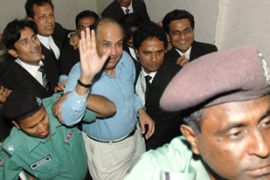Bangladesh arrests 50 politicians
Politicians likely to face charges of corruption, anti-state dealings and misuse of power.

Most of the politicians have been jailed for one month under the Special Powers Act (SPA) under which they can be held without being formally charged.
Salauddin Quader Chowdhury, the BNP chief parliamentary adviser, was among 19 political leaders arrested last week. Chowdhury, including eight other detainees, are close aides of Khaleda Zia, the former prime minister.
Misuse of power
The politicians are likely to face charges of corruption, involvement in anti-state and anti-people activities, and misuse of power to amass wealth, police said.
Mainul Husein, law and information adviser to the interim government, said on Tuesday the corruption cases would be tried by special courts for speedy disposal.
Oli Ahmed, leader of Liberal Democratic party, said: “Mere jailing of the corrupt politicians was not enough. The government should ensure they can never participate in elections.”
The crackdown was ordered by the caretaker government, headed by Fakhruddin Ahmed, former central bank chief, as part of a campaign to hold free and fair elections in the impoverished nation of 140 million people.
The election date has not yet been announced.
The government also asked the head of the Anti-Corruption Commission and other officials to resign, paving the way for its reconstitution.
Political parties and civil society have long been demanding reforms in the commission, saying it had failed to fight widespread graft.
Anti-graft convention
The government also decided to ratify the United Nations Convention Against Corruption in an effort to bring the country up to international governance standards, foreign ministry officials said.
Bangladesh declared a state of emergency on January 11.
An election planned for January 22 was postponed after 45 people were killed and hundreds injured in countrywide violence.
The interim authority is strongly backed by the powerful armed forces.
Analysts said the armed forces preferred a behind-the-scenes role, rather than direct intervention, to help Bangladesh out of its confrontational political climate.
Bangladesh was ruled by Hossain Mohammad Ershad, a former army general, from March 1982 when he seized power in a bloodless coup until he was toppled in a people’s uprising headed by Sheikh Hasina and Khaleda in December 1990.